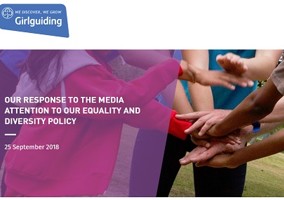In the last month there have been two unabashed attacks on different charities on the Guido Fawkes website.
Not this is not unusual in itself, but there was something different about these ones – they had been paid for, and written on behalf of, people running campaigns against those charities.
This means that the charities whose practices or campaigns were being called into question were not consulted prior to publication.
It all raises questions about charities should monitor as well as prepare for and respond to criticism in the media?
Advertorial vs editorial?
Advertorials are pieces of content that are a cross between advertisements, in that it’s a paid for slot, and editorial, because in that they are constructed to look like articles, rather than display adverts.
Crucially the writer has control over what they say in the piece. Journalists do not typically get involved in the production and the publication’s editorial standards or conventions do not need to be considered. Those being criticised are unlikely to have been warned ahead of publication or offered a chance to comment.
They must be clearly labelled as an “advertisement feature” or similar so that readers are aware it is not part of the publication’s editorial output.
Typically in the UK advertorial slots have been used to promote the benefits of products or services.
But what we’ve seen this month on Guido were negative attack pieces, which sought to cast a rival in a poor light - a technique that is more often seen in the US.
What does it look like?
Last week Guido carried a piece from the You Forgot the Birds campaign about the RSPB with the headline “Big losses to clip RSPB’s wings” claiming to have a leaked copy of the RSPB’s annual report, which will show a deficit of £10m, redundancies and a decline in membership.
The article was placed by Abzed, a PR firm, which boasts that: “We win for our clients through intuitive counter-campaigning which turns the tide in the media. We then use that momentum to persuade the politicians and regulators who hold the fate of the industry in their hands.”
It claims donors have “lost confidence in the RSPB” and that the charity is “mimicking the RSPCA’s death spiral with its ferocious legal attacks on those who dare to disagree”.
The article went on to criticise the RSPB for not publishing the number of birds on its reserves, for the number of press officers (34) and for media spin.
“Attacking everyone else has left the RSPB isolated,” it says and adds that “journalists have become jaundiced about the RSPB”.
It’s worth noting that earlier this summer the agency sent out a press release focusing on the number press officers relative to other charities (the RSPB disputes the interpretation and says that it appears high as there are a number of people around the country who deal with local media as part of their wider role). But this got hardly any coverage. So maybe real journalists have indeed got bored of the argument between RSPB and You Forgot the Birds.
The previous week Abzed had placed a piece accusing the Dogs Trust, RSPCA and the Kennel Club of being behind a Defra decision to ban e-collars, which deliver electric shocks to animals as a way to train them.
Headlined “Charities in the dog house” the article claimed that Defra had made its decision based on lobbying from charities, and not evidence.
Charities were accused of “monetising the British love of animals” and implies that their reason for wanting the ban was to grow their own income from dog training programmes.
“Defra has been played by some capitalist wolves dressed in sheep’s clothing,” it said.
Will anyone buy it?
If we’ve learned anything about online news and “fake news” in the last couple of years it is that most people are relatively uncritical of what they read.
Both pieces included footnotes linking to articles in the places like the Times and the Guardian, giving them credibility. For a layman, especially one minded to believe the worst of charities, they are highly convincing.
It is not that the articles are necessarily inaccurate, but that they only present the one side of a complex argument.
Looking at the comments on the articles it seems that the debate below the e-collar piece was largely between people who found them useful in training their pets and those who felt they were unnecessary if you had trained your pet well. Little mention was actually made of the charities.
Over on the RSPB article there was more focus on charities. There were suggestions that communist infiltration and the rise of “lefty warriors” was to blame, while readers assured each other that they did not give the charity any money.
One said: “It's sad when charities that used to champion such worthy causes get overrun and destroyed by leftist axe-grinders with an agenda that's nothing to do with animal welfare.”
One commentator began a discussion about how the RNLI is “going the same way”. And others complained about the RSPCA, WWF, Christian Aid, the National Trust and the Wildfowl and Wetlands Trust.
There was a limited defence of the charity, one said: “Sponsored by who, exactly? Pretty grotty takedown of a charity by anonymous. I'd like to know who is spending their money on this.”
In some cases readers were not bothered that it was sponsored, if it confirmed their view. One commenter on the e-collar piece said: “Yeah, sponsored stuff usually is rubbish. But in this case it's right. I am totally fed up with having nitwits like Gove banning stuff, putting up taxes and censoring us.”
What the charities say
Comments give just an extreme snapshot of people who were particularly incensed by an article, so we should rely too heavily on them, and charities are hopeful that most people will see it for what it is.
A spokeman for the RSPB said: “We are open about our policies as we welcome challenge and public debate. Good journalism and the media play a crucial role in facilitating that debate in a fair and open way.
“Whilst we don’t feel anyone could confuse this advert with well-researched journalism, it is interesting that YFTB now appear to be trying to cut out journalists by resorting to buying advertising space to place stories without any pretence of impartiality or balance of opinions.”
A Dog’s Trust spokesman, said: “We hope that most Guido readers are savvy enough to read between the lines. That a one-sided piece attacking charities – who are acting in the best interests of the animals they serve – and is paid for by a lobbying company isn’t going to be the whole story. The only right of reply we were offered was one that we had to pay for. If this had been freely offered to us we would have said that we had very little involvement in the programme on shock collars, were not involved in its Ofcom investigation - and that robust scientific evidence demonstrates that shock collars actually end up causing more harm than good.”
How much does this matter?
They key difference for charities is that in contrast to critical articles from the editorial team, charities were given no warning or opportunity to put their case ahead of publication.
It’s hard to say how charities should respond, or even if they should. Understandably charities would be cautious of paying for a response – it would probably lead to more criticism for being a waste of donor money. Staying quiet or reassuring a few targeted supporters may be the best approach.
In both these cases the charities are involved in long running, contentious disputes so it’s unlikely that this would happen to a charity completely out of the blue.
The chosen channel is potentially an issue here. Guido has a relatively niche audience of people mainly working in politics, public affairs and journalism. So this has the potential to be largely invisible to ordinary people, but give parliamentarians already opposed to charities the ammunition they need to drive through changes. Although you'd hope MPs might be more critical of what they read than ordinary people.
It would be much more concerning if the same tactic was being deployed across a national paper – so I don’t want to spread undue alarm. Nevertheless, this is an unwelcome development and charities, particularly those embarking on campaigns that are likely to attract enemies, should be alert to the possibility.
|
Related articles











